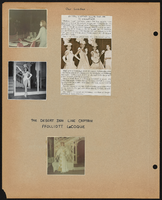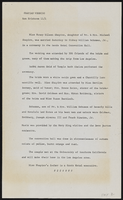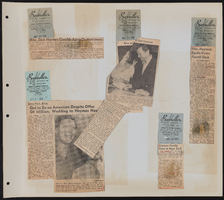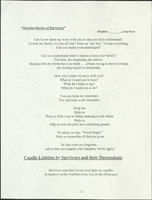Search the Special Collections and Archives Portal
Search Results
Edward Baca oral history interview
Identifier
Abstract
Oral history interview with Edward Baca conducted by Claytee D. White on January 28, 2016 for the Boyer Early Las Vegas Oral History Project. Baca opens his interview describing his parents and his youth in Wyoming. He then discusses moving to Bryce, Utah in the 1940s, his career in coal mining, and the process of removing coal from the mine. Baca describes his brief time working for the federal government, going to trade school to learn morse code, and working for the railroad. He then talks about switching careers to to work as an air conditioning insulator, and moving to Las Vegas, Nevada in 1969. Baca then describes how he found religion, his efforts to learn more about Christianity, and forming a ministry where he preaches. He discusses his Christian radio program, his singing ministry, and his efforts to save a Christian radio station from closing. Lastly, Baca discusses his religious music albums, touring in a religious music group, and faith healing.
Archival Collection
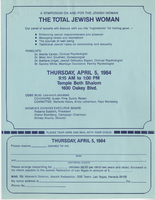
Correspondence about "The Total Jewish Woman" symposium, item 01
Description
A mail-out invitation for "The Total Jewish Woman."


Congregation Ner Tamid roundtable oral history interview: transcript
Date
Archival Collection
Description
Oral history interview with the Congregation Ner Tamid roundtable conducted by Barbara Tabach on September 21, 2016 for the Southern Nevada Jewish Heritage Project. In this interview, Rabbi Sanford Akselrad and five members of the congregation discuss the founding of Congregation Ner Tamid, the first reform synagogue in Las Vegas, Nevada, in 1974. They go into detail on how the synagogue was formed, the building-hopping they did until they built their current structure, and the funding it took to get to that point. The interviewees reveal a few donors, such as Morris Dalitz and Frank Sinatra, who helped to build their synagogue and school. The interview ends with meaningful stories and memories the members have relating to Congregation Ner Tamid.
Text

June Monroe and Kazuko Atomura oral history interview: transcripts
Date
Archival Collection
Description
Oral history interviews with June Monroe and Kazuko Atomura conducted by Cecilia Winchell and Stefani Evans on July 14 and July 19, 2022 for Reflections: the Las Vegas Asian American and Pacific Islander Oral History Project. In the first interview, Kazuko Atomura describes her childhood in Taiwan and Tokyo, Japan, and shares both happy and difficult mememories of that time. Atomura eventually moved to Los Angeles, California, where she reconnected with a man she previously met in Japan. She married him and together had their daughter, June Monroe, and another son while living in Corpus Christi, Texas. After difficult medical procedures involving Atomura's husband and Monroe's younger brother, Brian, the family relocated to Las Vegas, Nevada. Monroe recalls attending Las Vegas High School and Bonanza High School, and the struggle of making new friends as a young person. In the second interview, the mother and daughter discuss racism, discrimination, and identity. Kazuko Atomura recalls her many experiences with discrimination as a result of both her appearance and language barriers. June Monroe discusses how she came to be proud of her Japanese heritage, while Atomura discusses some of the community activities she has been involved in since living in Las Vegas including the Japanese Culture Club and odori dancing. Then, both Atomura and Monroe discuss Monroe's brother, Brian, who received two kidney transplants; one from Monroe's father and one from Monroe herself. Atomura talks about the shrines she has built for Brian, the experience of him being on dialysis, care taking, and his final days. Monroe shares about her activism with organ donation, being regularly involved with the Nevada Donor Network and helping to pass significant pieces of legislation within the area of organ donation.
Text


